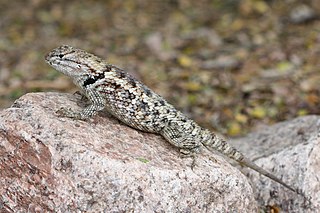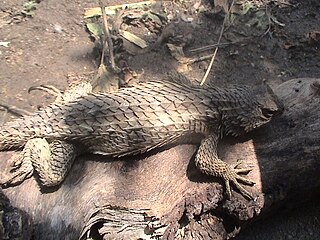
Spiny lizards is a common name for the genus Sceloporus in the family Phrynosomatidae. The genus is endemic to North America and Central America. This genus includes some of the most commonly seen lizards in the United States.

The western fence lizard is a common lizard of Arizona, New Mexico, California, Idaho, Nevada, Oregon, Utah, Washington, Northern Mexico, and the surrounding area. As the ventral abdomen of an adult is characteristically blue, it is also known as the blue-belly.

}

The eastern fence lizard is a medium-sized species of lizard in the family Phrynosomatidae. The species is found along forest edges, rock piles, and rotting logs or stumps in the eastern United States. It is sometimes referred to as the prairie lizard, fence swift, gray lizard, gravid lizard, northern fence lizard or pine lizard. It is also referred to colloquially as the horn-billed lizard. One of its most notable behaviors is that of its escape behavior when encountering fire ants.

Sceloporus grammicus is a species of lizard from Mexico and the southern United States. It is sometimes referred to as the mesquite lizard or graphic spiny lizard.

The silver-tipped myotis is a species of mouse-eared bat found in a range of lowland habitats in the Americas.

Isthmura bellii, commonly known as Bell's false brook salamander or Bell's salamander, is a species of salamander in the family Plethodontidae. It is endemic to Mexico and occurs mostly along the western and southern margins of the Mexican Plateau, with isolated populations elsewhere.

Saiphos equalis, commonly known as the yellow-bellied three-toed skink or simply three-toed skink, is a species of burrowing skink found in eastern Australia. It is the only species classified under the genus Saiphos.

Slevin's bunchgrass lizard is a species of lizard in the family Phrynosomatidae. The species is indigenous to the southwestern United States and adjacent northern Mexico.

Sceloporus bicanthalis, the trans volcanic bunchgrass lizard, is a species of lizard in the family Phrynosomatidae, first described by Hobart Muir Smith as a subspecies of Sceloporus aeneus in 1937. It is endemic to Mexico. It was classified by the IUCN as a species with low risk. No subspecies are recognized.
This page contains lists of reptiles found in the Sierra de Manantlán Biosphere Reserve, which straddles the states of Colima and Jalisco in Mexico. The reserve is located in the transition of the Nearctic and Neotropical realms and encompasses parts of the Sierra Madre del Sur, with a wide range of altitudes, climates and soils. The effects of tectonic and volcanic activities and erosion are notable within the reserve.

Sceloporus jarrovii, also known commonly as Yarrow's spiny lizard, is a species of lizard in the family Phrynosomatidae. The species is native to the southwestern United States and northern Mexico. There are two recognized subspecies.

Sceloporus virgatus, commonly known as the striped plateau lizard, is a species of lizard within the genus Sceloporus. This genus is known for the signaling modalities that it uses and exhibits, including visual motion and chemical signals that aid in identifying their territories as well as color that indicates aggression. The striped plateau lizard originates from the northern Sierra Madre Occidental and is relatively small in size, measuring less than 72 mm (2.8 in) in length.
Sceloporus aeneus, the southern bunchgrass lizard or black-bellied bunchgrass lizard, is a species of lizard in the family Phrynosomatidae. It is endemic to Mexico.
Sceloporus chaneyi, the Peña Nevada agave lizard, Chaney's spiny lizard, or Chaney's bunchgrass lizard, is a species of lizard in the family Phrynosomatidae. It is endemic to Mexico.
Sceloporus cyanostictus, Yarrow's spiny lizard, is a species of lizard in the family Phrynosomatidae. It is endemic to Mexico.
Sceloporus goldmani, Goldman's bunchgrass lizard, is a species of lizard in the family Phrynosomatidae. It is endemic to Mexico.

Sceloporus horridus, the horrible spiny lizard, rough lizard, or southern rough lizard, is a species of lizard in the family Phrynosomatidae. It is endemic to Mexico.
Sceloporus maculosus, the spotted spiny lizard or northern snub-nosed lizard, is a species of lizard in the family Phrynosomatidae. It is endemic to Mexico.

Sceloporus minor, the minor lizard or red minor lizard, is a species of lizard in the family Phrynosomatidae. It is endemic to Mexico.















